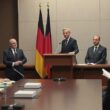The Christian Democratic Union (CDU) faces a perilous dilemma regarding its stance towards the Alternative for Germany (AfD), according to political scientist Constantin Wurthmann, who warns against abandoning the established “firewall” separating the two parties. In an interview with the Rheinische Post, Wurthmann cautioned that the CDU’s responsibility in maintaining this division is paramount for its own survival, citing numerous national and international studies demonstrating the detrimental consequences when such barriers are dissolved.
Wurthmann dismissed the notion that the CDU can meaningfully recapture support from AfD voters, arguing that a significant portion of the AfD’s base has never aligned with the CDU. Furthermore, he rebuked claims that the firewall has incited the AfD to become more radical. Instead, he pointed to a concerning pattern over the past twelve years where the CDU has increasingly adopted positions and rhetoric previously pioneered by the AfD, suggesting a desperate attempt to appeal to a broader electorate. This, he argued, has inadvertently spurred the AfD to further radicalize its platform to distinguish itself as the “authentic” alternative.
“Abgrenzung [separation] “can” function” Wurthmann conceded, “but it has never been done correctly.
The critique reflects a broader anxiety within the German political landscape as the CDU grapples with declining support and a fragmented electorate. Konstantin von Notz, the Green Party’s parliamentary group deputy leader, lauded the recent strong statements from CDU leader Friedrich Merz explicitly rejecting collaboration with the AfD, praising similar pronouncements from the CSU. Von Notz vehemently rejected any suggestion that the CDU is seriously considering dismantling the firewall. He characterized such a move as “unthinkable” a betrayal of the CDU’s historical success and a self-destructive act that would irrevocably damage the party’s core identity. “It’s an absolute riddle how some within the CDU could arrive at the idea of increasingly cooperating with the AfD” he stated.
Merz himself reinforced his unwavering position against any partnership with the AfD, tying his commitment to this stance directly to his leadership role. He emphasized that collaboration is impossible with a party that fundamentally challenges the values and achievements of modern Germany. The CDU leadership is scheduled to convene a closed-door meeting this Sunday to discuss future engagement with the AfD, highlighting the urgency and complexity of the situation. The internal debate underscores a growing tension between pragmatic electoral calculations and upholding democratic principles in the face of a rising and increasingly polarized, political force.





